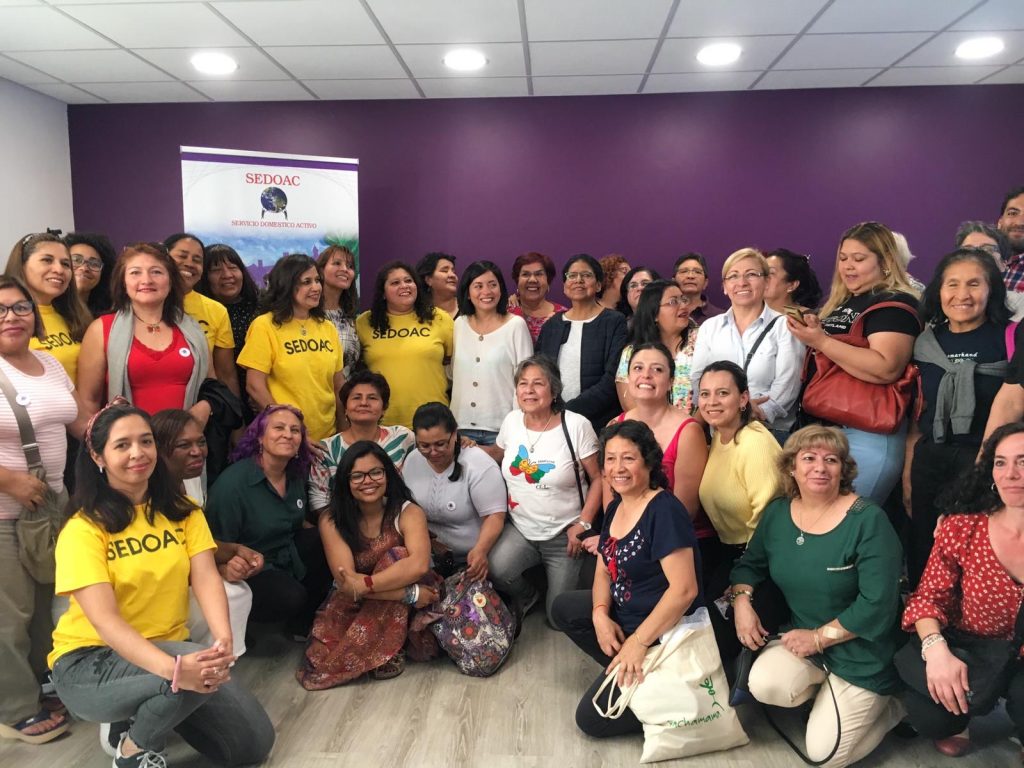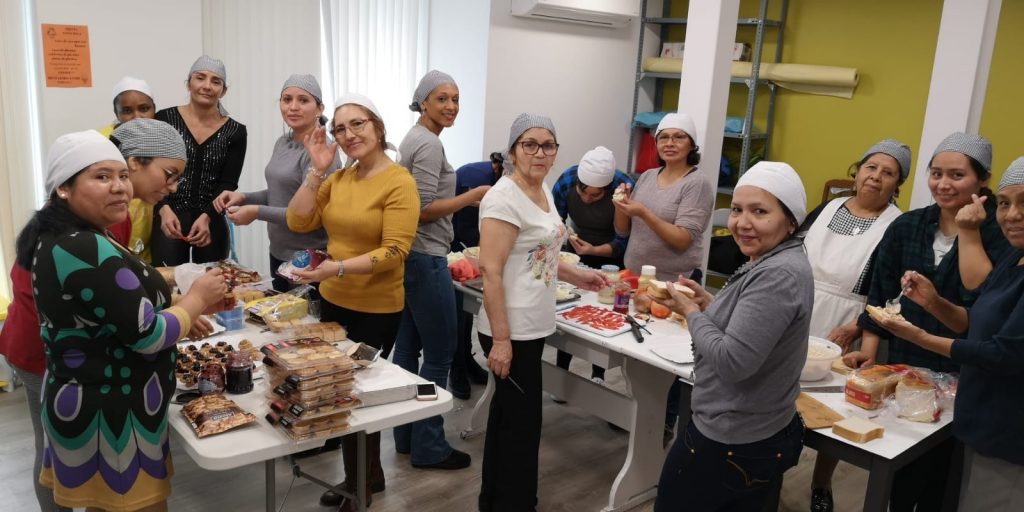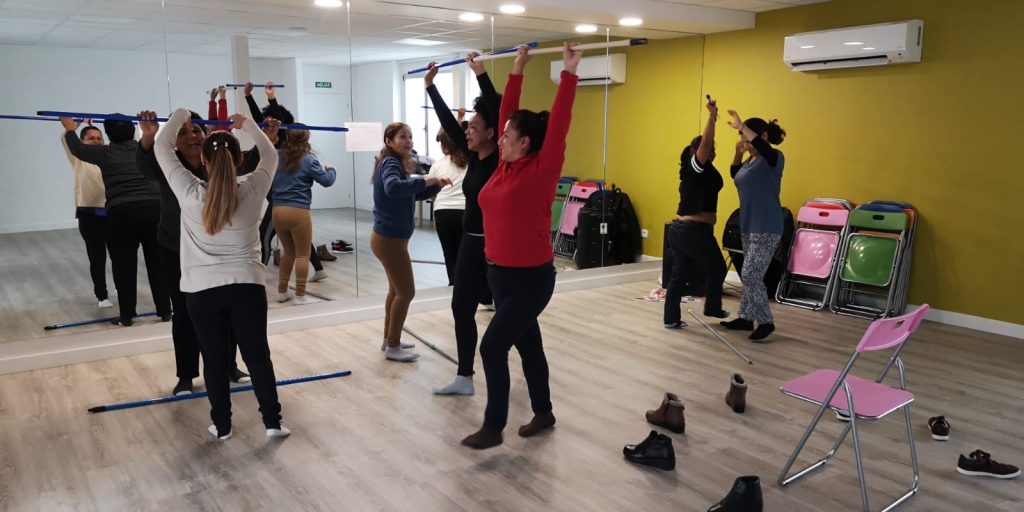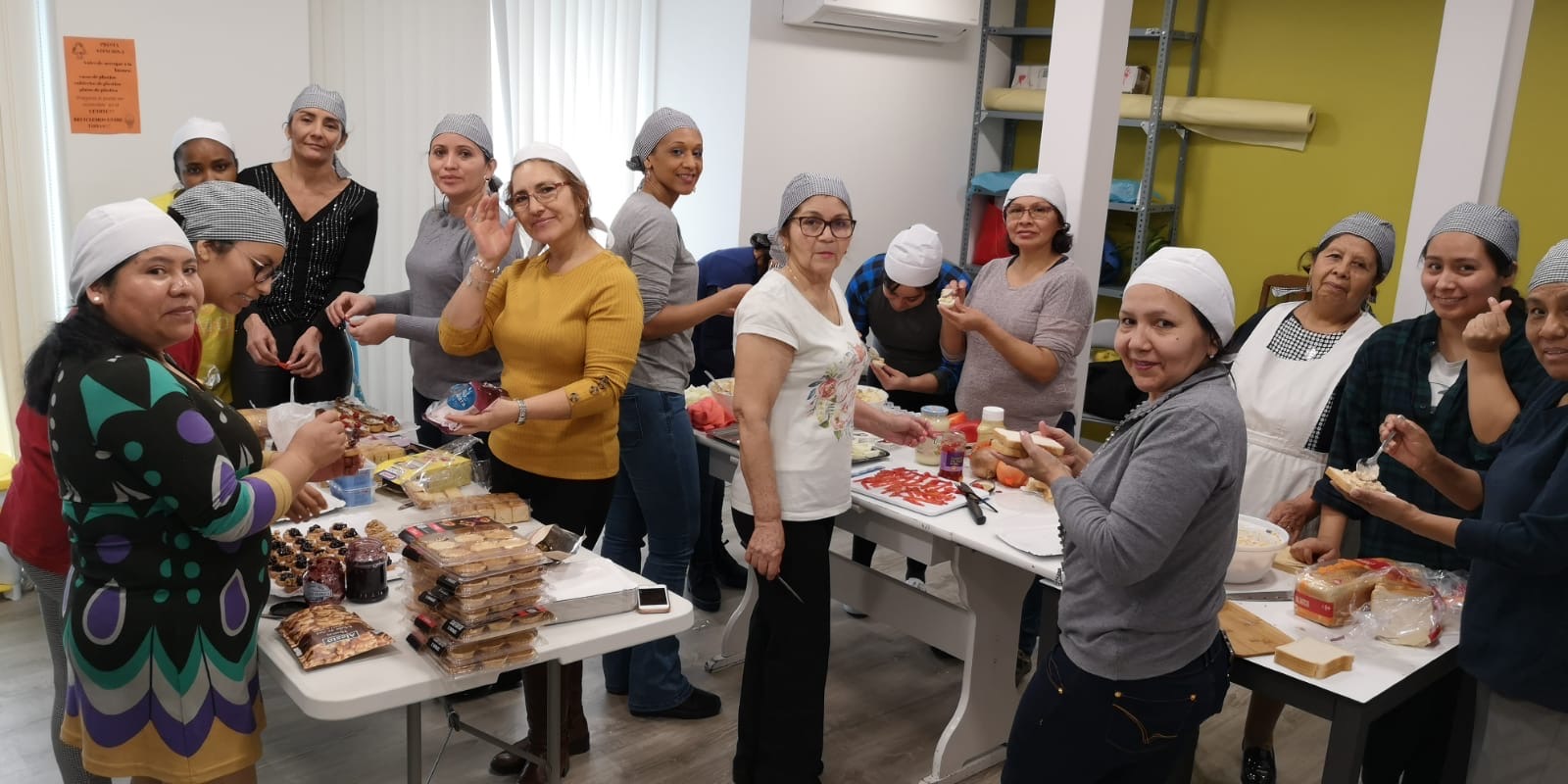It was early June 2019 when a pioneering Center for the Empowerment of Domestic and Care Workers (CETHYC) was inaugurated in Madrid. The ceremony included emotive speeches from many, who after two years of negotiations with Madrid’s city council, could now call this center their home. It is the first center to provide integral assistance to domestic workers including legal advice, psychological help, and access to recreational activities and spaces. CETHYC was the result of a collaborative effort between Servicio Doméstico Activo (SEDOAC), a collective of female Latin American domestic workers based in Spain, and Usera, a district in south Madrid.

As a 2019 Global Fellow of Urban Practice, I partnered with SEDOAC during the summer to conduct research on the domestic work sector in Spain. The CETHYC opened during the first week of my arrival, and during my three months in Madrid I witnessed first-hand how it revolutionized the lives of many domestic workers. SEDOAC was founded by a group of migrants from the Americas who joined forces in 2008. Tired of being subjected to triple discrimination – for being women, migrants, and domestic workers – they decided to create a collective (SEDOAC) to dignify and render visible the domestic work sector in Spain. Their aim has since been to fight for labor rights, build solidarity, and empower women that live under similar circumstances, through, for example, the creation of coalitions with like-minded organizations.
Madrid’s new mayor José Luis Martinez Almeida recently approved the 2020 budget, which eliminates funding for CETHYC, dealing a blow to an innovative center that had just been gathering momentum. The gravity of funding suppression is underlined by the psychological toll of the internationalization of reproduction work, the highly asymmetrical relations between Spanish employers and irregular migrants, and racial profiling techniques that make public spaces unsafe.
In a historical context, CETHYC’s presence is groundbreaking and of enormous consequence. In the last twenty years, around four million immigrants have entered Spain. Although the country was previously characterized by its emigration trends, global and local dynamics have transformed Spain into a receiving country. In the nineties, after Franco’s death and the return to democracy, Spain re-opened relations with Latin American countries (Leinaweaver). Simultaneously, post-industrial Spain saw the growth of its white-collar force, which was accompanied by a large introduction of women to the professional field (Parella Rubio). These social phenomena created a new demand for domestic workers; new professionals started seeking women outside of the family who could take charge of their household’s reproductive duties. As a result of this, thousands of women from Latin American countries began to migrate to Spain in search of job opportunities. Those who reach the country undocumented are thrown into the informal economy and most likely work as internas (live-in maids), and usually have only one day and half off per week. Internas work longer hours for less pay than workers who have their own housing, and do not have the luxury to separate home from work. The blurring between the home and work spheres renders internas more vulnerable to exploitation, but racial profiling practices by the Spanish police makes them seek these arrangements to prevent encounters that could endanger their immigrant status. In this context, the CETHYC functioned as de facto housing for domestic workers. Although it is groundbreaking for the domestic work sector in general, it is undeniably crucial for internas who sometimes are abruptly fired and thus left homeless. For this reason, during CETHYC’s inauguration, Carolina Elías, SEDOAC’s director, said domestic workers “finally have a home.”
The CETHYC was part of an initiative called Fondo de Reequilibro Territorial (Territorial Rebalancing Fund), designed by Madrid’s previous government led by ex-mayor Manuela Carmena and the leftist Ahora Mas party. The fund was created in 2016 and two of its most crucial priorities were urban improvement as well as social and employment intervention in Madrid’s most unequal and vulnerable districts. The municipality hired researchers to develop a ‘vulnerability ranking’ to determine which districts in Madrid were in the most dire socioeconomic situations, and thus the most in need of funding and participatory initiatives. In other words, the aim of the plan was to correct the existent inequality between districts.
The Usera district – where CETHYC was created – was the third most vulnerable in the ranking. Rommy Arce was Usera’s district councilor during Carmena’s term and served as the the governmental representative that worked alongside SEDOAC to advocate in favor of the CETHYC. Usera is the district within Madrid with the largest proportion of domestic workers: 17% out of the district’s population, while the median for the other districts in the city is 12%. This figure could be higher given that it excludes those who are not registered in the Social Security system and thus work informally. It is worth noting that Arce, a Latin American immigrant herself, was the most controversial councilor in Carmena’s cabinet and the first naturalized immigrant to serve as councilor in Madrid. Arce arrived in Spain when she was fifteen and worked in the domestic sector for some time as well. She has been in the midst of controversies for her condemnation of institutional racism.
The CETHYC has tangibly impacted the lives of many domestic workers,
regardless of its short lifespan. The €200,000 grant allowed SEDOAC to hire a social worker, a communitarian psychologist, and a lawyer that could assist the needs of those who contacted CETHYC. One of the main purposes of the Center was to give free and integral assistance to any domestic worker who needed it. By integral, SEDOAC meant legal, psychological, and physical assistance. In matters of legal assistance, the lawyer was available for any queries migrant workers have regarding their rights. Before the establishment of CETHYC, domestic workers might have opted to stay quiet when facing exploitation because of lack of knowledge regarding their legal rights and fear of unemployment or deportation. However, the weekend workshops organized by the collective, and the availability of a lawyer, helped educate and empower many domestic workers. In interviews I conducted after Almeida’s decision, the Honduran Karla Yoverilza Girón Alvarado mentioned “when there’s a workshop about immigration the entire CETHYC fills up because there is a lot of need. We are a lot of Latinas who need to know our rights. Many of us get deported because we don’t know them”.

Besides the importance of legal counseling, the CETHYC also functions as a
safe space for racialized migrants. Currently, police officers are allowed by Spanish law to search people in public spaces and ask them for their documentation. Carmena’s government had introduced a program (PIPE) to suppress these practices, but Almeida abolished it. Using racial profiling techniques, they tend to guide their searches using phenotypical attributes. Not coincidentally, racialized immigrants are disproportionately targeted by these searches, instilling fear in them to be around public spaces. In this sense, stripping them of their right to enjoy urban life. Police officers know in which neighborhoods immigrants predominate and at what times they are most likely taking public transportation services to leave work or get home. Since the officers’ salary is dependent on their productivity, which is weighted by how many undocumented immigrants they send to detention, they are financially incentivized to target racialized immigrants. This is a crucial reason for which Latin American undocumented immigrants arriving to Madrid choose to work as internas.
Five years after her arrival to Madrid, police officers detained Karla after having asked her for her documents. Karla recalls the overwhelming lack of information that existed in those years regarding the rights of immigrants in Spain. According to her, this lacuna tremendously exacerbates the vulnerability, fear, and trauma they feel. “You suffer a lot of trauma when you’re detained by the police. You might get a nice officer but you might also get an officer that psychologically and verbally abuses you,” she said to me. Detained migrants are taken to a CIE (Detention Center for Foreigners), where they can be abused. She is thankful that now migrants in the CETHYC can learn how to react in those situations. The Colombian Blanca Vásquez, another member of SEDOAC, recounted to me how she “arrived to Spain convinced she was illegal, but SEDOAC and the CETHYC taught [her] that nobody is illegal, and [her] undocumented status is merely an administrative issue.”

In another vein, women who partake in domestic labor often suffer demoralizing solitude and self-esteem problems. Internas, in particular, have to spend an entire week without leaving their employer’s household and, consequently, are very isolated. Additionally, many Latina domestic workers are heads of households and sustain their children back home with the remittances they send. They are faced with the paradoxical task of becoming caretakers in Spain while not being able to raise their own children. This takes an indescribable emotional toll on them. For this reason, Ana Camargo was hired by SEDOAC as a communitarian psychologist. Camargo helped domestic workers process the pain and guilt they feel due to the transnational motherhood they embody. Since its inception, the CETHYC has been a space for catharsis. According to Karla, the CETHYC gave her life an 180 degrees turn. Before its opening, she used to hate weekends; now, as soon as she can leave work on Saturday, she runs towards the Center so she can see her compañeras, laugh with them, and even cry with them. “We cry and let it all out but we also say ‘enough’. We clean our faces and we stand up, because that is what SEDOAC really is. It’s a collective that empowers you psychologically and physically. It makes you see that you are valuable as a woman and as a person, and it makes you see capabilities that you did not think you had before.”
Although SEDOAC can still manage the space for the next four years due to legal arrangements settled by Ahora Mas, the current government (PP) will no longer disperse the funds that allowed SEDOAC to hire its team. UN’s Special Rapporteur on Poverty visited the Center, and impressed by it, urged Madrid’s City Council to revisit their position. SEDOAC has reached out to Loreto Sordo, Usera’s new councilor, but to this day, she has not accepted their invitation to the CETHYC. According to government authorities, they have to take into account the needs and demands of citizens when planning out funding distribution. Ms. Elías told el Diario that in the past six months at least 3 women have arrived to CETHYC asking for assistance of some sort. These incidents make it clear that the need is undeniable.
In spite of the fact that the government has tried to cut domestic workers’ wings with their decision, CETHYC has forever altered the lives and mindsets of its members. The solidarity they have experienced in their gatherings has empowered them to fight for a reconsideration. When I asked Blanca and Karla about how CETHYC changed their lives, they both highlighted the importance of the community they found there and the radical transformation it created in their personal lives and self-regard. Karla told me she now “feels at peace with [herself], she is not the woman that she was before.” Ms. Elías said SEDOAC will keep fighting through activism but those who devoted themselves full time into the project, will need to find another job. However, one thing is for certain, the power of community experienced by the workers will undoubtedly guide their future organizing.
Bibliography
Jones, Sam. “UN poverty expert’s visit shines light on struggles of Spain’s poor.” The Guardian, 06 February 2020, https://www.theguardian.com/world/2020/feb/06/un-poverty-experts-visit-shines-light-on-struggles-of-spains-poor.
Leinaweaver, Jessaca. “Transatlantic Unity on Display: The ‘White Legend’ and the ‘Pact of Silence’ in Madrid’s Museum of the Americas.” History & Anthropology, vol. 28, no. 1, Feb. 2017, pp. 39–57.
O’Kuinghttons, Ursula, and Patricia Villaruel. “Veinte años del ‘Boom’ de la inmigración latinoamericana.” El País , 21 Jan. 2018, elpais.com/politica/2018/01/08/actualidad/1515409208_575807.html.
Parella Rubio, Sònia. Mujer, Inmigrante y Trabajadora: La Triple discriminación. Anthropos Editorial, 2003.
Peinado, Fernando and Juan Diego Quesada. “Policías con vía libre para cachear inmigrantes.” El País, 26 June 2019, https://elpais.com/ccaa/2019/06/25/madrid/1561488317_777633.html
Perez Mendoza, Sofía. “Un centro pionero de atención a empleadas domésticas, en riesgo por el recorte de ayudas de Almeida.”, El Diario, 26 December 2019, https://www.eldiario.es/madrid/empleadas-domesticas-Madrid-financiacion-Ayuntamiento_0_975702516.html
Redacción Cibeles, “El Ayuntamiento de Madrid destina 166,3 millones de euros a reequilibrar la ciudad en este mandato”, Diario de Madrid, 03 March 2019, https://diario.madrid.es/blog/2019/03/03/el-ayuntamiento-de-madrid-destina-1663- millones-de-euros-a-reequilibrar-la-ciudad/
“Stop Racism Not People, Racial Profiling and Immigration Control in Spain.” Amnesty International , Peter Benenson House, 2011, www.amnesty.ch/de/laender/europa-zentralasien/spanien/dok/2011/diskriminierung-polizei/beric ht-stop-racism-not-people.-racial-profiling-and-immigration-control-in-spain.-14.-dezember-201 1.-45-seiten.

